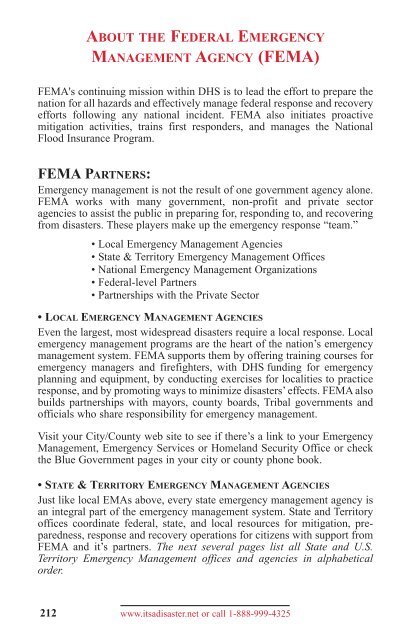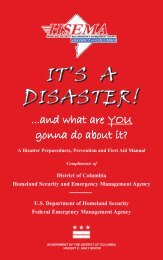disaster 5th 1108_5th ed 2011 - Homeland Security and Emergency ...
disaster 5th 1108_5th ed 2011 - Homeland Security and Emergency ...
disaster 5th 1108_5th ed 2011 - Homeland Security and Emergency ...
Create successful ePaper yourself
Turn your PDF publications into a flip-book with our unique Google optimized e-Paper software.
ABOUT THE FEDERAL EMERGENCY<br />
MANAGEMENT AGENCY (FEMA)<br />
FEMA's continuing mission within DHS is to lead the effort to prepare the<br />
nation for all hazards <strong>and</strong> effectively manage f<strong>ed</strong>eral response <strong>and</strong> recovery<br />
efforts following any national incident. FEMA also initiates proactive<br />
mitigation activities, trains first responders, <strong>and</strong> manages the National<br />
Flood Insurance Program.<br />
FEMA PARTNERS:<br />
<strong>Emergency</strong> management is not the result of one government agency alone.<br />
FEMA works with many government, non-profit <strong>and</strong> private sector<br />
agencies to assist the public in preparing for, responding to, <strong>and</strong> recovering<br />
from <strong>disaster</strong>s. These players make up the emergency response “team.”<br />
• Local <strong>Emergency</strong> Management Agencies<br />
• State & Territory <strong>Emergency</strong> Management Offices<br />
• National <strong>Emergency</strong> Management Organizations<br />
• F<strong>ed</strong>eral-level Partners<br />
• Partnerships with the Private Sector<br />
• LOCAL EMERGENCY MANAGEMENT AGENCIES<br />
Even the largest, most widespread <strong>disaster</strong>s require a local response. Local<br />
emergency management programs are the heart of the nation’s emergency<br />
management system. FEMA supports them by offering training courses for<br />
emergency managers <strong>and</strong> firefighters, with DHS funding for emergency<br />
planning <strong>and</strong> equipment, by conducting exercises for localities to practice<br />
response, <strong>and</strong> by promoting ways to minimize <strong>disaster</strong>s’ effects. FEMA also<br />
builds partnerships with mayors, county boards, Tribal governments <strong>and</strong><br />
officials who share responsibility for emergency management.<br />
Visit your City/County web site to see if there’s a link to your <strong>Emergency</strong><br />
Management, <strong>Emergency</strong> Services or <strong>Homel<strong>and</strong></strong> <strong>Security</strong> Office or check<br />
the Blue Government pages in your city or county phone book.<br />
• STATE & TERRITORY EMERGENCY MANAGEMENT AGENCIES<br />
Just like local EMAs above, every state emergency management agency is<br />
an integral part of the emergency management system. State <strong>and</strong> Territory<br />
offices coordinate f<strong>ed</strong>eral, state, <strong>and</strong> local resources for mitigation, prepar<strong>ed</strong>ness,<br />
response <strong>and</strong> recovery operations for citizens with support from<br />
FEMA <strong>and</strong> it’s partners. The next several pages list all State <strong>and</strong> U.S.<br />
Territory <strong>Emergency</strong> Management offices <strong>and</strong> agencies in alphabetical<br />
order.<br />
212 www.itsa<strong>disaster</strong>.net or call 1-888-999-4325





